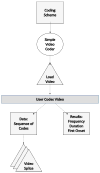The Simple Video Coder: A free tool for efficiently coding social video data
- PMID: 27503301
- PMCID: PMC5298951
- DOI: 10.3758/s13428-016-0787-0
The Simple Video Coder: A free tool for efficiently coding social video data
Abstract
Videotaping of experimental sessions is a common practice across many disciplines of psychology, ranging from clinical therapy, to developmental science, to animal research. Audio-visual data are a rich source of information that can be easily recorded; however, analysis of the recordings presents a major obstacle to project completion. Coding behavior is time-consuming and often requires ad-hoc training of a student coder. In addition, existing software is either prohibitively expensive or cumbersome, which leaves researchers with inadequate tools to quickly process video data. We offer the Simple Video Coder-free, open-source software for behavior coding that is flexible in accommodating different experimental designs, is intuitive for students to use, and produces outcome measures of event timing, frequency, and duration. Finally, the software also offers extraction tools to splice video into coded segments suitable for training future human coders or for use as input for pattern classification algorithms.
Keywords: Behavior coding; Open-source software; Video analysis.
Figures


References
-
- Adolph KE, Berger SE. Motor development. Handbook of Child Psychology. 2006 http://doi/org/10.1002/9780470147658.chpsy0204. - DOI
-
- Coan JA, Gottman JM. The specific affect coding system (SPAFF) Handbook of Emotion Elicitation and Assessment. 2007:267–285.
-
- Datavyu Team. Databrary Project. New York University; 2014. Datavyu: A Video Coding Tool. http://datavyu.org.
-
- Eilam D, Golani I. The ontogeny of exploratory behavior in the house rat (Rattus rattus): The mobility gradient. Developmental Psychobiology. 1988;21(7):679–710. http://doi.org/10.1002/dev.420210707. - DOI - PubMed
-
- Farroni T, Csibra G, Simion F, Johnson MH. Eye contact detection in humans from birth. Proceedings of the National Academy of Sciences. 2002;99(14):9602–9605. http://doi.org/10.1073/pnas.152159999. - DOI - PMC - PubMed
MeSH terms
Grants and funding
LinkOut - more resources
Full Text Sources
Other Literature Sources

